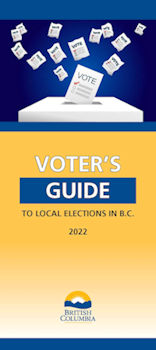Voter eligibility
Provincial legislation gives eligible B.C. residents the right to vote in general local elections and by-elections. This right is subject to certain restrictions, limitations and requirements. Additionally, local governments are required to provide access to voting, through various opportunities, such as an advance voting day.
Voting rights are granted to citizens based on residency or property ownership. There is no corporate or business vote in local elections.
Resident electors
In order to be eligible to vote in general local elections or by-elections as a resident or non-resident property elector, a person must:
- Be 18 years of age or older when they register to vote, or 18 years or older on general voting day
- Be a Canadian citizen
- Have been a resident of B. C. for at least six months immediately before they register to vote
- Be a resident of the municipality or electoral area on the day they register to vote; and
- Not be disqualified under the Local Government Act, or any other enactment from voting in local elections or be otherwise disqualified by law
Voting rights are granted to citizens based on residency or property ownership. There is no corporate or business vote in local elections.
Eligible electors who live on a First Nation reserve can vote. Where that person votes depends on whether the reserve is located within a municipality or regional district jurisdiction.
Non-resident property electors
When a person lives in one jurisdiction and owns property in one or more other jurisdictions, they may vote once in each of the other jurisdictions where they own property - as long as they meet the voter eligibility requirements.
A non-resident property elector must:
- Be 18 years of age or older when they register to vote, or 18 years or older on general voting day
- Be a Canadian citizen
- Have been a resident of B. C. for at least six months immediately before they register to vote
- Be the registered owner of real property in the jurisdiction where they intend to vote for at least 30 days immediately before they register to vote and
- Not be disqualified under the Local Government Act, or any other enactment from voting in local elections or be otherwise disqualified by law
If a person owns a property with one or more other individuals, only one person is eligible to vote as the non-resident property elector for that property. The owner entitled to vote must be designated, in writing, by the majority of the property owners.
A person cannot vote on behalf of a corporation, or as a non-resident property elector, based on a property owned wholly or in part by a corporation.
Voters Living on Reserve
Eligible Indigenous and non-Indigenous electors who live on Reserve can vote. Where that person votes depends on whether the Reserve overlaps with or is adjacent to a municipality or regional district boundary .
Students
Students who live in one jurisdiction and attend an educational institution in a jurisdiction different from their usual place of residence may vote only once--either in the jurisdiction where they attend school or in the jurisdiction that is their usual place of residence.
Voter Ineligibility
Resident electors and non-resident property electors are not eligible to vote in a local election if they:
- Have been convicted and sentenced for an indictable offence and are in custody
- Have been found guilty of an election offence, such as intimidation or vote-buying
- Do not otherwise meet voter eligibility requirements
Local Elections Legislation
Learn about voter eligibility and voting in local elections.
Guidance and resources
Elections BC
Contact information
Contact us if you have legislative questions about general local elections.
250 387-4020
1 800 663-7867


